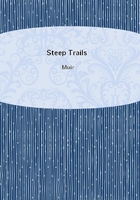
第19章 IV(5)
When the bloom of the Shasta chaparral is falling, the ground is sometimes covered for hundreds of square miles to a depth of half an inch. But the bloom of this fertile snow cloud grew and matured and fell to a depth of two feet in a few hours. Some crystals landed with their rays almost perfect, but most of them were worn and broken by striking against one another, or by rolling on the ground. The touch of these snow-flowers in calm weather is infinitely gentle--glinting, swaying, settling silently in the dry mountain air, or massed in flakes soft and downy. To lie out alone in the mountains of a still night and be touched by the first of these small silent messengers from the sky is a memorable experience, and the fineness of that touch none will forget. But the storm-blast laden with crisp, sharp snow seems to crush and bruise and stupefy with its multitude of stings, and compels the bravest to turn and flee.
The snow fell without abatement until an hour or two after what seemed to be the natural darkness of the night. Up to the time the storm first broke on the summit its development was remarkably gentle.
There was a deliberate growth of clouds, a weaving of translucent tissue above, then the roar of the wind and the thunder, and the darkening flight of snow. Its subsidence was not less sudden. The clouds broke and vanished, not a crystal was left in the sky, and the stars shone out with pure and tranquil radiance.
During the storm we lay on our backs so as to present as little surface as possible to the wind, and to let the drift pass over us.
The mealy snow sifted into the folds of our clothing and in many places reached the skin. We were glad at first to see the snow packing about us, hoping it would deaden the force of the wind, but it soon froze into a stiff, crusty heap as the temperature fell, rather augmenting our novel misery.
When the heat became unendurable, on some spot where steam was escaping through the sludge, we tried to stop it with snow and mud, or shifted a little at a time by shoving with our heels; for to stand in blank exposure to the fearful wind in our frozen-and-broiled condition seemed certain death. The acrid incrustations sublimed from the escaping gases frequently gave way, opening new vents to scald us;and, fearing that if at any time the wind should fall, carbonic acid, which often formed a considerable portion of the gaseous exhalations of volcanoes, might collect in sufficient quantities to cause sleep and death, I warned Jerome against forgetting himself for a single moment, even should his sufferings admit of such a thing.
Accordingly, when during the long, dreary watches of the night we roused from a state of half-consciousness, we called each other by name in a frightened, startled way, each fearing the other might be benumbed or dead. The ordinary sensations of cold give but a faint conception of that which comes on after hard climbing with want of food and sleep in such exposure as this. Life is then seen to be a fire, that now smoulders, now brightens, and may be easily quenched.
The weary hours wore away like dim half-forgotten years, so long and eventful they seemed, though we did nothing but suffer. Still the pain was not always of that bitter, intense kind that precludes thought and takes away all capacity for enjoyment. A sort of dreamy stupor came on at times in which we fancied we saw dry, resinous logs suitable for campfires, just as after going days without food men fancy they see bread.